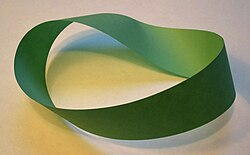Möbius strip
Jump to navigation
Jump to search
See also: Mobius strip and Moebius strip
English
[edit]
Alternative forms
[edit]Etymology
[edit]Named after August Ferdinand Möbius (1790–1868), one of two German mathematicians—the other being Johann Benedict Listing (1808–1882)—who independently discovered the strip at the same time (1858).
Pronunciation
[edit]- (UK) IPA(key): /ˈmɜː.bi.əs stɹɪp/, IPA(key): /ˈməʊ.bi.əs stɹɪp/
- (US) IPA(key): /ˈmoʊ.bi.əs stɹɪp/
Audio (US): (file)
Noun
[edit]Möbius strip (plural Möbius strips)
- (topology) A one-sided surface formed by identifying two opposite edges of a square in opposite senses;
a narrow strip given a half twist and joined at the ends, forming a three-dimensional embedding of said surface.- 1981, William Irwin Thompson, The Time Falling Bodies Take to Light: Mythology, Sexuality and the Origins of Culture, page 8:
- Like a mind moving on a Möbius strip of events, one's consciousness goes over the same territory again and again without ever becoming aware of the nature of awareness.
- 1991, Theoni Pappas, More Joy of Mathematics, Wide World Publishing, page 117,
- B. F. Goodrich Co. has a patent for a Möbius strip conveyor belt. It lasts longer since the wear and tear is spread uniformly over the entire surface.
- 1992, Speculations in Science and Technology, Volume 15, Elsevier Sequoia, page 221:
- A geometrical model of electron (positron) structure is presented based upon an object of two linked loops obtained by cutting a Möbius strip asymmetrically.
- 2013 November 16, Patrick McGuinness, “Who's afraid of Marcel Proust?”, in The Daily Telegraph (Review)[1], page R20:
- Proust's novel grew and deepened into over 3,000 pages of everything and nothing: a Möbius strip of profundity twisting into mundanity, mundanity twisting into profundity.
Synonyms
[edit]- Möbius band, Möbius loop
- twisted cylinder (rare)
Related terms
[edit]Translations
[edit]one-sided surface
|
narrow strip given a half twist
|
- The translations below need to be checked and inserted above into the appropriate translation tables. See instructions at Wiktionary:Entry layout § Translations.
Translations to be checked
|
